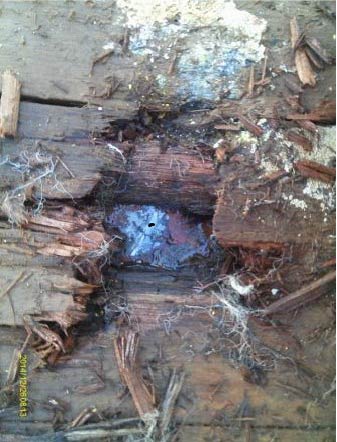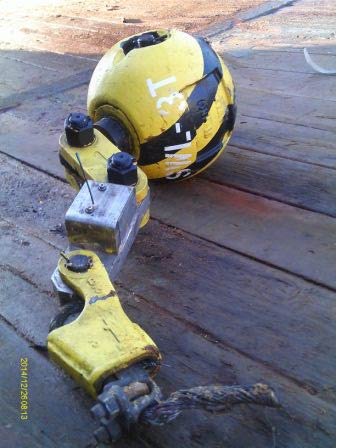Dropped object near-miss: Falling crane block
A member has reported an incident in which a crane wire parted and the hook block then fell to deck (approximately 15 metres) landing in close proximity to the deck crew. The incident occurred when a vessel was engaged in cargo operations with an offshore rig, requiring the off-loading of a food container. The rig crane was fitted with two wires; one heavy duty (which was used to off-load the container) and another wire of smaller diameter which was left hanging approximately 6 metres below the crane boom and not connected for the operation.
The rig crane attempted to lift the food container but the container was found to be too heavy, and was immediately returned to deck. Upon safe landing, the heavy duty wire was then disconnected by the deck crew. However, upon disconnection and before the deck crew had cleared the area, the crane driver started to retrieve the smaller wire instead of the heavy duty one. The smaller wire was heaved all the way up to the crane boom, at which point the hook block came into contact with the end of the boom, causing the smaller wire to part. The hook block then fell to deck and landed close to the crew on deck. There were no injuries.
Had the crane block hit anyone, the consequences could have been fatal.


Investigation is still underway, but the following points may be noted:
- Actual damage: the crane block destroyed sections of wood planks on main deck and damaged the bunker tank top
- The rig crane’s limit switches/stops were apparen’tly not fully operational, thereby allowing the hook block to be heaved all the way up to the boom.
Our member took the following immediate actions:
- ‘Time Out for Safety’ at the earliest opportunity to discuss this incident;
- emphasized the importance of a clear deck policy, and to remain clear of any suspended load or work;
- Reminded their crew to remain vigilant to human error that may affect the work being undertaken, or other works in the vicinity;
- Be aware of the operation and condition of third party equipment – see above;
- Ensure effective and immediate forms of communication were established at all times with equipment operators, to ensure safe operational practices were maintained and the Stop Work Policy could be rapidly executed and communicated if an un-safe condition occurs.
- Further inspection and testing of limit switches to ensure that no similar technical failure exists onboard; . Emphasised the need to prepare to exercise the Stop Work Policy if third party equipment is not safe, or there are concerns about its condition and/or operation;
Members should be aware of IMCA guidance and IMCA safety promotional material on lifting equipment, as follows:
- Guidelines for lifting operations
- Lifting operations (pocket card)
- Lifting equipment (pocket card)
Members may wish to refer to the following similar incidents (key words: dropped, crane block):
Safety Event
Published: 5 February 2015
Download: IMCA SF 02/15
IMCA Safety Flashes
Submit a Report
IMCA Safety Flashes summarise key safety matters and incidents, allowing lessons to be more easily learnt for the benefit of all. The effectiveness of the IMCA Safety Flash system depends on Members sharing information and so avoiding repeat incidents. Please consider adding safetyreports@imca-int.com to your internal distribution list for safety alerts or manually submitting information on incidents you consider may be relevant. All information is anonymised or sanitised, as appropriate.
IMCA’s store terms and conditions (https://www.imca-int.com/legal-notices/terms/) apply to all downloads from IMCA’s website, including this document.
IMCA makes every effort to ensure the accuracy and reliability of the data contained in the documents it publishes, but IMCA shall not be liable for any guidance and/or recommendation and/or statement herein contained. The information contained in this document does not fulfil or replace any individual’s or Member's legal, regulatory or other duties or obligations in respect of their operations. Individuals and Members remain solely responsible for the safe, lawful and proper conduct of their operations.
